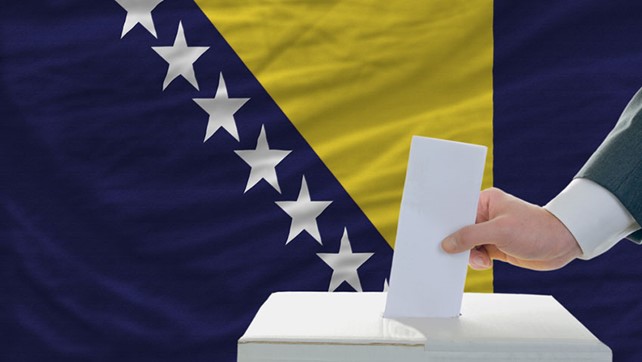Kovačević v. Bosnia and Herzegovina, No. 43651/22, ECtHR (Fourth Section), 29 August 2023

In Kovačević v. Bosnia and Herzegovina of 29 August 2023, the European Court of Human Rights (ECtHR) ruled on the compatibility of the ethnically-territorially based consociative political system adopted in Bosnia and Herzegovina after the signing of the Dayton Peace Agreement with the general prohibition of discrimination enshrined in Article 1 of Protocol No. 12 to the European Convention for the Protection of Human Rights and Fundamental Freedoms (ECHR).
Before describing the facts that gave rise to the case, it is necessary to provide some information on the current territorial and institutional set-up of Bosnia and Herzegovina. At the territorial level, the Constitution establishes two federal entities: the Republika Srpska and the Federation of Bosnia and Herzegovina. In addition, it distinguish between 'constituent peoples' (Bosniacs, Serbs and Croats), the three main ethnic groups present in the country, and 'others', members of other ethnic minorities as well as those who prefer not to declare their membership of a particular ethnic group. In the present case, Mr. Kovačević complained that it was impossible for him to freely exercise his right to vote because, due to the institutional architecture of the country and the above-mentioned ethnic criteria, he could not vote for Serbs candidates, but only for Bosniacs or Croats candidates for the House of Peoples of the Federation of Bosnia and Herzegovina. This, in turn, also affected the designation of seats in the House of Peoples of the Parliamentary Assembly, which is done precisely through indirect election by the parliamentary assemblies of the entities. Moreover, the applicant complained that his freedom to vote for the members of the Presidency of Bosnia and Herzegovina was limited. In fact, according to the Constitution and the Electoral Law, the Presidency of the country is composed of three members, one Bosniac and one Croat, who are elected exclusively by the residents of the Federation of Bosnia and Herzegovina, and one Serb elected, likewise, only in the electoral constituencies of Republika Srpska. In the applicant's view, such a solution constituted discrimination, restricting the choice of voters only to candidates of their constituent people and with respect to their residence.
The judges of the Fourth Section of the ECtHR stated that discrimination on the basis of a person's ethnic origin constitutes a form of racial discrimination which is particularly serious and, given its dangerous consequences, requires special vigilance on the part of the authorities. That is why the authorities must use all available means to combat racism, thus strengthening the democratic vision of a society in which diversity is not perceived as a threat but as a source of enrichment (see Sejdić and Finci v. Bosnia and Herzegovina, § 43). The Court further stated that no difference in treatment based exclusively or to a decisive extent on a person's ethnic origin can be objectively justified in a democratic society built on the principles of pluralism and respect for different cultures. That said, the judges pointed out that Article 14 ECHR does not prevent the Contracting Parties from treating groups differently to correct 'de facto inequalities'. However, in the case of Bosnia and Herzegovina, the Court noted that this combination of territorial and ethnic requirements amounted to discriminatory treatment in violation of Article 1 of Protocol No. 12 in the context of the right to participate in elections to the House of Peoples of the Parliamentary Assembly of Bosnia and Herzegovina. The judges considered that the same criterion did apply also to the right to vote in the elections for the Presidency of Bosnia and Herzegovina, since the applicant did not have the opportunity to vote for candidates who did not declare that they belonged to any of the 'constituent peoples' (since such candidates did not even have the right to stand for election).
Moreover, being a resident of the Federation of Bosnia and Herzegovina, Mr Kovačević was not entitled to vote for candidates declaring ethnic Serb affiliation, elected exclusively within Republika Srpska. Therefore, unlike the persons of the Federation of Bosnia and Herzegovina declaring their affiliation to the Bosniacs or Croats and the persons of Republika Srpska declaring their affiliation to the Serbs, the applicant was not really represented in the collective presidency. He was therefore treated differently because of his place of residence and ethnicity. In this regard, the Court observed that the Presidency is a political organ of the State and not of the Entities. Its policies and decisions affect all citizens of Bosnia and Herzegovina, whether they live in the Federation of Bosnia and Herzegovina or in Republika Srpska. Therefore, no one should be forced to vote only along predetermined ethnic lines, regardless of their political views. The Court concluded that, even if a system of ethnic representation is maintained in some form, it should meet certain requirements. First, it should be secondary to political representation; secondly, it should not discriminate against 'others'; and, third, it should include ethnic representation from the entire territory of the state. In the light of this, the ECtHR found a violation of Article 1 of Protocol No. 12 ECHR.
(Comment by Edin Skrebo)

